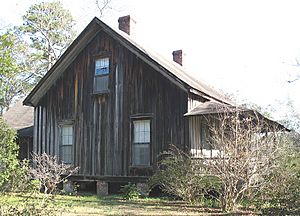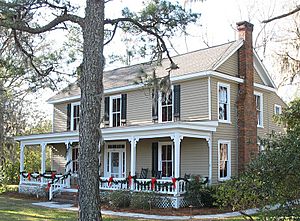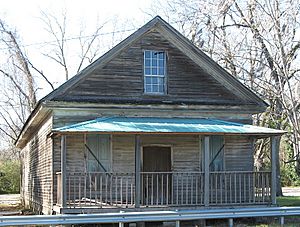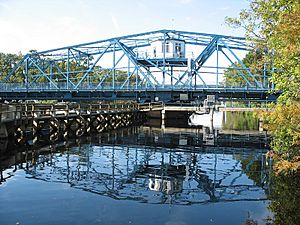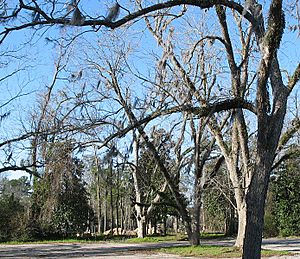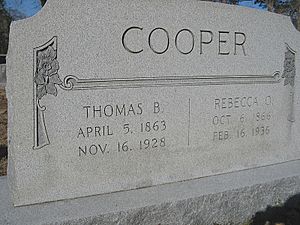Socastee Historic District facts for kids
Quick facts for kids |
|
|
Socastee Historic District
|
|
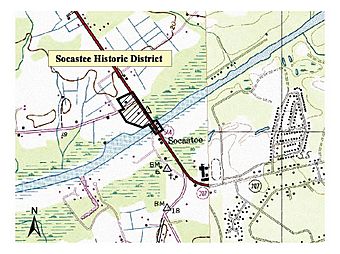
Map: Courtesy of South Carolina Department of Archives and History
|
|
| Location | SC 544, 0.5 mi. N of Indtracoastal Waterway, Socastee, South Carolina |
|---|---|
| Area | 4 acres (1.6 ha) |
| Built | 1881 |
| Architect | Prince, Robert M., Sr.; Tidewater Construction Corporation |
| Architectural style | Massed-plan side gabled |
| NRHP reference No. | 02000558 |
| Added to NRHP | May 22, 2002 |
The Socastee Historic District is a special area in Socastee, South Carolina. It's located right by the Intracoastal Waterway. This district was added to the National Register of Historic Places in 2002. This means it's an important place in history that should be protected.
The district includes several old buildings and structures. There's a metal swing bridge, two historic houses, an old store, and even a pecan grove. These parts show what life was like in Socastee after the American Civil War. It's one of the few places left that still looks much like it did back then.
Contents
Historic Buildings in Socastee
This section explores the important buildings that make up the Socastee Historic District. Each one tells a part of the area's history.
Samuel S. Sarvis House
Samuel Sarvis built his house in 1881. He built it just before he got married. This house is a key part of the historic district.
Thomas B. Cooper House
The Thomas B. Cooper house was built in 1908. Robert M. Prince, Jr. built it for Mr. Cooper. The outside of the house has been updated recently.
Thomas B. Cooper Store
The Thomas B. Cooper store was built in 1905. It was a busy place for many years. The store closed its doors in 1932.
The Socastee Swing Bridge
The Socastee swing bridge is a very important part of the district. The U.S. Corps of Engineers designed it. It's a special type of bridge that can swing open. This allows boats to pass through the waterway. The bridge opened in 1936. It is 217 feet (66 m) long and 24 feet (7.3 m) wide.
A pamphlet from 1936 says the Tidewater Construction Corporation built the bridge. However, a 1981 survey found a plate on the bridge. This plate had the name Virginia Bridge & Iron Company. It's likely that Virginia Bridge & Iron Company made the parts. Then, Tidewater Construction Corporation put them all together.
When it was first built, people had to turn the bridge by hand. The person who operated the bridge lived in a house right at the top. The first operator stayed at the Thomas B. Cooper house.
For a long time, this swing bridge was the only way to cross the Intracoastal Waterway in Socastee. Before it, people used ferries. The bridge is on Highway 544. There were plans to close it after a new bridge was built nearby. The new bridge helped with traffic, especially during tourist season. But it would have made it hard for local people to get around. Many residents needed the old bridge to reach Forestbrook Road and Peach Tree Road. So, the Socastee swing bridge is not just historic. It's still used every day by people in the area.
The Pecan Grove
Near the Thomas B. Cooper store, there is an old pecan grove. This grove is also part of the historic district.
Important People of Socastee
These individuals played a big role in the early history of Socastee.
Samuel S. Sarvis (1843 - 1931)
Samuel S. Sarvis was a soldier in the Civil War. He served with the South Carolina 26th Infantry. After the war, he became a merchant and owned a store. He was also a business partner in a company called Dusenbury & Sarvis. In 1896, Mr. Sarvis became the postmaster of Socastee. His store was also the post office, which was common in small towns back then.
Thomas B. Cooper (1863 - 1928)
Thomas B. Cooper also served as the postmaster of Socastee. He held this important job in 1908.
 | Leon Lynch |
 | Milton P. Webster |
 | Ferdinand Smith |




